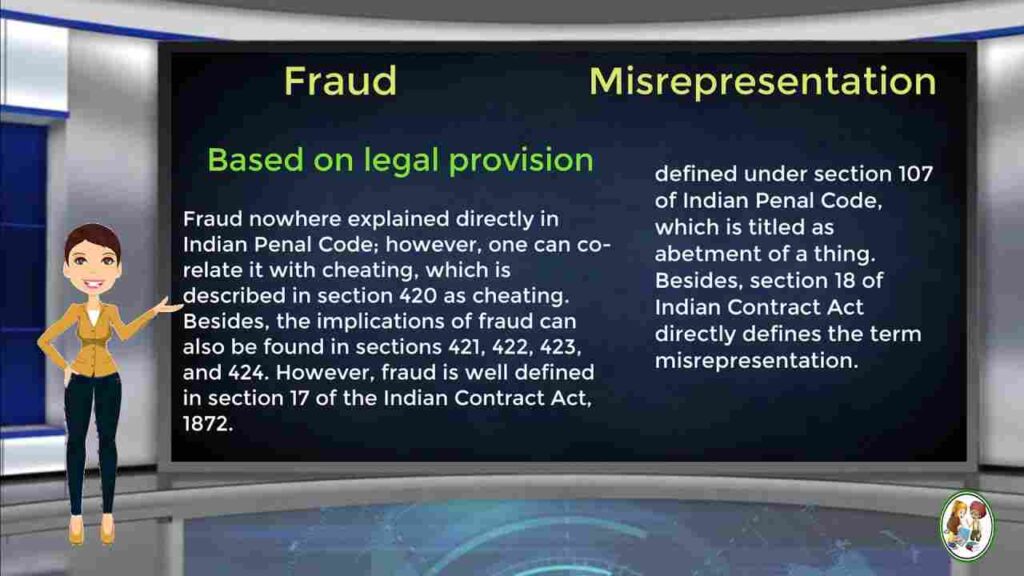
Explore 15 Key Difference between fraud and misrepresentation
Fraud and misrepresentation are two distinct concepts in the realm of law and ethics. While both involve deceitful actions, there are significant differences between them. Here are 15 key difference between fraud and misrepresentation, explained in simple terms for your upcoming exams:
Difference between fraud and misrepresentation
Fraud is defined as a purposeful act of deception, whereas misrepresentation is the making of a false statement or assertion by one party to another.
Fraud must have the intention to deceive or manipulate, whereas misrepresentation can happen accidentally or as the result of a misunderstanding.
Knowledge: While misrepresentation can occur even if a person is unaware of the falsehood, fraud occurs when the person making false statements or hiding facts is fully aware of their deceitful nature.
The goal of fraud is typically to obtain an unfair advantage, financial gain, or to cause harm to a third party, whereas the goal of misrepresentation may be due to carelessness, unintentional errors, or incomplete information.
Materiality: While misrepresentation can involve minor or less significant false statements, fraud frequently involves major or substantial misrepresentations that are essential to the transaction.
Negligence: Unlike fraud, which involves deliberate actions to deceive, misrepresentation can occur as a result of negligence, carelessness, or a lack of reasonable investigation.
Reliance: While misrepresentation may or may not involve reliance on the false information, fraud necessitates the victim’s reliance on the false statements or actions.
Proof: While misrepresentation can be established by showing that false information was provided, fraud can be established by showing evidence of intent, which can be difficult to establish.
Legal repercussions: Misrepresentation may result in civil liability or contractual remedies, whereas fraud is generally regarded as a more serious offence and may be punished with fines, jail time, and other penalties.
Unintentional misrepresentation: Unlike fraud, which is always done with the intent to deceive, unintentional misrepresentation can be made.
False statements or assertions are the main focus of misrepresentation, whereas intentional concealment of important facts is a common component of fraud.
Timing: While misrepresentation can happen both before and after the contract is established, fraud typically takes place before or during the formation of a contract or agreement.
Liability: In a misrepresentation, the person who provided false information may be held accountable, but depending on the circumstances, liability may be shared or mitigated. In fraud, the person who engaged in the deceptive act is responsible for their actions.
Punitive damages: While misrepresentation frequently does not involve punitive damages, fraudulent acts may result in their imposition. Punitive damages are intended to punish the wrongdoer.
Legal remedies: Whereas misrepresentation may lead to similar remedies but with different legal standards, fraud may result in additional legal remedies such as rescission (cancelling the contract) and restitution (recovering damages).
For specific cases or circumstances involving fraud or misrepresentation, it is crucial to seek legal advice because laws can change depending on the location and specifics.
Also Read: 15 Difference between prokaryotic and eukaryotic cell for class 11